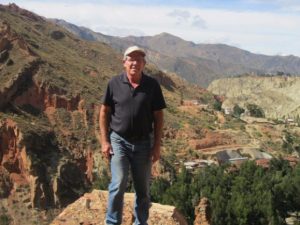At Natural Intelligence we specialize in advising public, private, and civil society sectors on adaptation to an increasingly unstable world. More than business continuity, we assist our clients in assessing their business, development and governance models relative to the changes that are already underway in society and the natural world. From supply chain failures and extreme weather events, to preparing for deglobalization with localization. Business as usual is no longer an option. We conduct assessments, review documents, interview key actors, prepare plans, draft policies/regulations/legislation, develop curriculum, conduct trainings, and more.

Christian Stalberg, Principal
With professional backgrounds in construction, energy engineering, telecomputing, hazard mitigation, emergency management, management consulting, international development, ecovillage design & development, business start-ups, organic farming, machining, landscape gardening, public regulatory & policy analysis, instruction, and college teaching, Christian is a systems thinker, planner and strategist.
Stalberg has a BA in Environmental Studies & Planning from Sonoma State University, and an MS in Biomimicry from Arizona State University. He is currently working on his PhD in Anthropology and Social Change at California Institute of Integral Studies.
In 2022 Christian completed a Fulbright assignment at the University of Pretoria (UP) where he taught building energy modeling and ecological design principles to graduate and honors students in the Architecture Department. In collaboration with the UP Architecture Department, he also gave an energy modeling software training workshop to members of the Pretoria Institute for Architecture. Stalberg also gave the Boukunde Talk lecture entitled ‘The Ecological Civilization’. This was the first public lecture since the COVID-19 lockdown.
Between 2021-2022, Stalberg was hired by the United Nations Development Program (UNDP) Bolivia office to conduct an assessment of the Bolivian central government’s official planning approach of ‘Vivir Bien’ within the context of accelerating climate change. The assessment included a field trip across several different Bolivian territories to conduct interviews with strategic social and political actors across the different sectors of Bolivian society of university, government, private, and civil society, including indigenous and campesino, about their views on Vivir Bien with particular emphasis on their experiencing the impacts of climate change. A series of four reports were generated during the almost one-year engagement, with the final report outlining a series of pilot projects that UNDP could undertake towards manifesting Vivir Bien in the midst of increasing climate fluctuations. The suggested projects cover a range of measures, generally speaking however they all center around localization, self-reliance and self-sufficiency.
Among many professional experiences, it is important to note that Christian worked as a Hazard Mitigation Specialist for the Federal Emergency Management Agency (FEMA), the California Governor’s Office of Emergency Services (Cal OES), and as an independent consultant to federal, state and local governments. Mitigation and adaptation are not easily distinguishable from one another. Either one can and should include the other in order to achieve an optimized comprehensive solution.
Christian’s CV is available upon request.